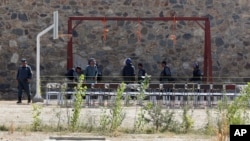Afghan authorities executed five men convicted of gang rape, despite allegations of flawed legal proceedings.
Former President Hamid Karzai signed the execution order last month on his last day in office.
In August, eight men, some dressed in police uniforms, stopped a family's car outside Kabul and sexually assaulted four women, including one who was pregnant.
A public outcry followed, with street demonstrations in support of the victims.
Seven men were initially sentenced to death for robbery and extramarital sex in a two-hour trial last month. An appeals court later reduced two of the sentences to prison terms.
Trial criticized
Given the quick trial and executions, human rights groups questioned whether due-process standards were met.
They had asked new President Ashraf Ghani to stay the executions so the proceedings could be reviewed.
David Griffiths, Asia-Pacific deputy director of Amnesty International, said that while the crime was regrettable, the proceedings were "marred by inconsistencies, uninvestigated torture claims and political interference."
Griffiths added that it was "deeply disappointing" that Ghani allowed the executions.
Human Rights Watch called the September trials "badly flawed."
A statement by the group shortly after the conviction said with allegations of coerced confessions and inadequate time to prepare a defense, the trials violated international due process standards and protections under Afghan law.
The men were hanged Wednesday at a prison in the capital. Three suspects remain at large.
A Kabul resident told VOA the hangings should have been "public and in front of media ... so people will learn from this mistake."
VOA's Afghan service contributed to this report.





